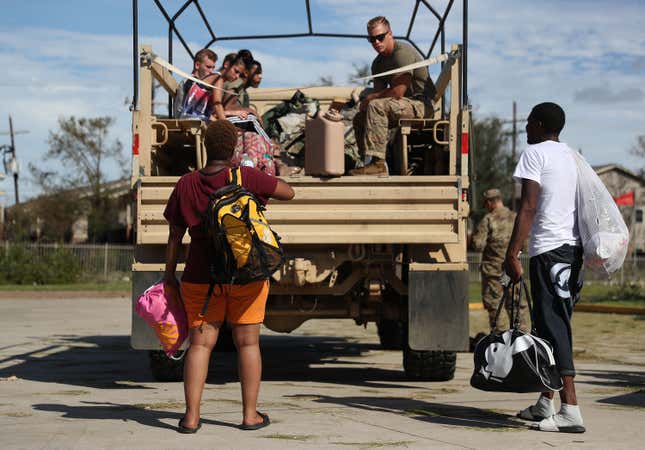
In the aftermath of Hurricane Laura, hundreds of thousands of people across the state of Louisiana are still without power or water. But those seeking shelter—either because they lack access to important resources or because they have no home to return to—will not find it in Lafayette, according to city officials.
The city was largely spared the worst of the storm, so it’s certainly in a position to help out its neighbors. But on Saturday, the city’s chief administrative officer told humanitarian groups it was not welcoming hurricane evacuees out of fears of “outside agitators” at local protests.
From The Washington Post:
“We are not in a position to safeguard people displaced by Laura,” Cydra Wingerter, Lafayette’s chief administrative officer, wrote in an email to area humanitarian groups Saturday, according to the Acadiana Advocate. “We know that bad actors will take our hospitality and use it against us.”
As the Advocate reports, Lafayette—like many other cities across the country, including Minneapolis, Portland, Atlanta, Washington D.C., New York, and most recently, Kenosha Wis.,— has seen a surge of protests this summer, as demonstrators call for an end to racist police violence in their communities.
In Lafayette, protesters have specifically called out Parish Mayor-President Josh Guillory’s response to the death of Trayford Pellerin. Lafayette police officers shot and killed the 31-year-old Pellerin, allegedly armed with a knife, on Aug. 21.
As the Lafayette Daily Advertiser reports, Lafayette police say they were responding to a call at a Circle K gas station about “a disturbance involving a person armed with a knife.” There, police encountered Pellerin, whom they tried to apprehend. A witness at the scene told the local paper that Pellerin continued to walk away from officers, who followed him for half a mile before they unsuccessfully tried to stop him with a Taser.
Then, as Pellerin attempted to enter a Shell gas station—walking away from police the entire time—officers fired 11 bullets at him, killing him.
Six officers involved in the shooting were placed on leave as a result of the incident, which is being investigated by state police. Since Pellerin’s killing, video of the shooting has been shared online, prompting the Louisiana ACLU to condemn it as a “horrific and deadly incident of police violence against a Black person,” reports The Post.
What happened next in Lafayette is not unique for this year—nor is it particularly unusual given the history of racist policing and mass protest in this country.
From The Post:
People descended to a Confederate monument downtown to carry signs and block traffic. At another demonstration, some people lit a highway median on fire and police set off smoke canisters, the Associated Press reported. There was a silent sit-in outside city hall, and a cookout on Mayor-President Josh Guillory’s front steps.
Over the course of about a week of demonstrations, police arrested dozens of people, most of them from Lafayette or nearby cities, the Advocate reported. But elected officials repeatedly insisted outside figures were influencing protests.
“They’re not our community. They’re not our people,” Scott Morgan, the interim police chief, said at a news conference Saturday. “They’re coming over here for trouble. Don’t support them, don’t get involved with them. Stay out of it.”
While this country has seen civil unrest in its past, the levels of violence this year are noteworthy, in no small part due to the responses from heavily militarized police forces and violent conservative militias and counter-protesters.
Still, rather than tell the truth about the protests—or take responsibility for the turbulent climate city officials have helped to create—Lafayette is happy to parrot a widely-repeated and untrue talking point, at the cost of people in dire need.
Jamie Angelle, communications director for Lafayette Consolidated Government, told the Advocate that the state of Louisiana should be able to care for hurricane evacuees without aid from the city itself. Angelle also noted that every hotel in the parish is currently booked.
“I don’t think this will prevent anyone from getting shelter,” Angelle said. “Will they have to maybe go a little farther? Unfortunately, that’s probably the case.”

